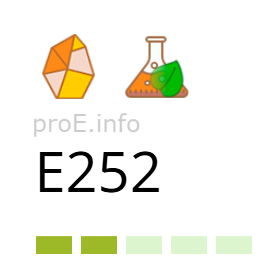
Other names for the additive (synonyms)
General Information
Potassium nitrate (food additive E252) is a crystalline powder without color or odor, used in the food industry as a preservative. It helps extend the shelf life of products and prevents the growth of microorganisms.
In nature, potassium nitrate occurs rarely. Historically, it was obtained from wood ash, a mixture of manure and limestone. Today, additive E252 is produced on an industrial scale mainly from potash or by chemical synthesis.
The chemical formula of potassium nitrate is KNO3. This substance melts at 333–334 °C and decomposes when heated above 400 °C, releasing oxygen. Due to its properties, preservative E252 can react with reducing agents and combustible substances, acting as an oxidizer.
The main physicochemical properties of additive E252: good solubility in water, absence of odor, salty-bitter taste. These characteristics make it convenient for use in the food industry.
Effects on the Body
Benefits of Additive E252
For the human body, food additive E252 has no significant health benefits. It is not an essential nutrient and does not participate in metabolism.
However, some recent studies show that potassium nitrate (KNO₃) may have positive effects on the body. For example, an experiment on mice demonstrated that dietary supplementation improved the strength and functional properties of extensor muscles. These results suggest that the compound may support muscle function and enhance physical performance under certain conditions.
Other clinical studies confirm the potential beneficial effect of potassium nitrate in the treatment of certain cardiovascular conditions. In patients with heart failure, potassium nitrate intake increased exercise duration and positively affected quality of life.
Risks of Additive E252
Potential risks are mainly related to the fact that potassium nitrate in the body can be converted into nitrites. The latter may affect the circulatory system by causing the formation of methemoglobin, which reduces the blood’s ability to carry oxygen.
Large epidemiological data do not confirm a significant link between nitrate intake and the risk of developing cancer. For instance, the NutriNet-Santé study showed that nitrate consumption, including from food additives such as E252, was not associated with an increased likelihood of colorectal or other cancers.
Nevertheless, studies indicate that significant exceedance of the acceptable intake level of potassium nitrate (additive E252) may cause specific side effects. According to the New Jersey Department of Health and WHO, high concentrations of KNO₃ can impair the blood’s oxygen-carrying capacity, leading to headaches, dizziness, general weakness, and cyanosis of the skin and lips.
Some clinical case reports indicate the possibility of acute poisoning. Potassium nitrate intake, including as part of traditional remedies such as “kalmi shora,” may lead to methemoglobinemia and cyanosis — dangerous conditions requiring emergency medical care.
Experimental data on animals indicate that long-term consumption of solutions containing 2–3% KNO₃ did not cause significant toxic effects. Moreover, mice showed prolonged lifespan and less pronounced pathological changes compared to the control group.
JECFA (Joint FAO/WHO Expert Committee on Food Additives) established an ADI for additive E252 at 0–3.7 mg/kg body weight per day. FDA (USA) shares a similar view, noting that the additive is safe in strictly limited amounts.
Studies by EFSA (European Food Safety Authority) confirmed that when the acceptable daily intake (ADI) is observed, potassium nitrate does not pose serious health risks. The committee also noted that the contribution of potassium nitrate as a food additive accounts for less than 5% of the total nitrate intake in humans (mainly from vegetables and contaminated drinking water).
In summary, despite certain risks, under controlled use preservative E252 is considered relatively safe. Health risks are associated not so much with the additive itself, but with the total nitrate intake from food.
Uses
In the food industry, preservative E252 is mainly used in the production of meat and fish products. Potassium nitrate is added to sausages, ham, smoked meats, and anchovies. It contributes to the characteristic taste, aroma, and color of products while reducing microbial activity.
In cheesemaking, additive E252 is used to prevent “swelling” of cheese caused by gas-producing bacteria.
Potassium nitrate has relatively weak antimicrobial activity. Its primary role lies in the fact that during storage and processing it is converted into nitrites, which provide the preservative effect.
Beyond the food industry, potassium nitrate has other applications:
- used in glass manufacturing;
- a component of pyrotechnic mixtures and gunpowder;
- applied in rocket propellants;
- serves as a mineral fertilizer that increases plant frost resistance;
- added to toothpaste to reduce tooth sensitivity.
Legal Status
In the European Union, potassium nitrate (E252) is permitted, but only in strictly defined product categories and limited concentrations (Regulation (EC) No 1333/2008). Similar rules apply in Ukraine, where the preservative is allowed in meat processing and cheesemaking.
In Canada and the USA, the use of potassium nitrate salt is restricted and permitted only in certain meat product categories.
In Norway and several other countries, the use of preservative E252 is significantly restricted due to potential health risks when exceeding established limits. In Japan, the additive is also used in limited amounts and under strict control.
The acceptable daily intake (ADI) set by EFSA and JECFA remains valid at 3.7 mg/kg body weight per day.